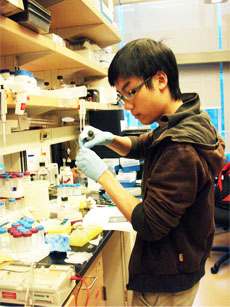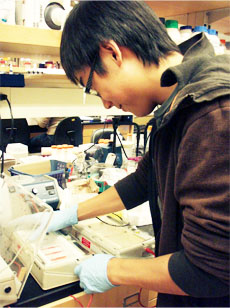Team:British Columbia/Notebook/Week 9
From 2011.igem.org

 |
 |
 |
 |
 |
Contents |
July 31 2011
Track: Alpha-pinene synthase
Joe is troubleshooting his PCR reaction in preparation of his yeast and biobrick plasmid construction. This time he used an annealing temperature of 60 degree Celsius, the low range for Phusion Hot Start Polymerase. The results after gel verification show a supercoiled DNA above the 1kb ladder and a small non-specific high molecular weight smear near 6-8kb. This was unexpected as the pinene synathase should be around 2.1kb long. It is unknown why this may be. Next time, he will try increasing the extension time and a higher annealing temperature.
August 01 2011
Track: Alpha-pinene synthase
Yup... troubleshooting the previous PCR reaction again. Joe used an annealing temperature of 63 degree Celsius and 65 degree Celsius, plus a 2 minute extension time. The same results were seen after the gel verification. However, a clear band could be seen this time at 7-8kb. Again, this is not the product Joe wanted. It should be noted that the synthase gene has a long stretch A's at the 3' end of the gene. Therefore, the reverse primer has a long stretch of T's. It may be the forward primer is annealing to the sequence while the reverse primer is not annealing due to the long stretch of the same nucleotide.
August 02 2011
Track: Beta-pinene synthase
5 colonies grew on Marianne's biobrick plate! Marianne ran a colony PCR on all the colonies and conducted a gel verification. Unfortunately, none of them showed bands at the correct length (~2000bp). It seems that the miniprepped plasmids of pSB1C3 we have are problematic. Therefore, the plan is to resuspend the pSB1C3 in the 2011 Spring Biobrick Kit Plate 1 A3, transform them, and miniprep them for a fresh tube of pSB1C3.
 "
"

















